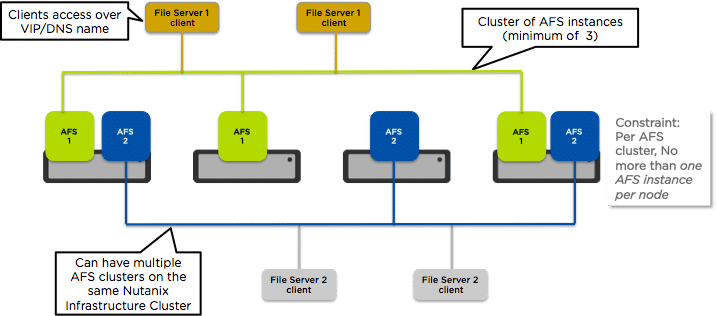![]() Nutanix has announced the release of their web-scale native file serving solution, Acropolis File Services (AFS), which leverages the same technology as Nutanix Enterprise Clouds. Built to simplify data centers, AFS helps solve the issue of cost, complexity and scalability challenges related to storing and serving unstructured data such as home directories, user profiles, application logs and department shares. To this end, AFS customers are given the ability to be fully out-of-the-box and natively operational with virtual machines and files.
Nutanix has announced the release of their web-scale native file serving solution, Acropolis File Services (AFS), which leverages the same technology as Nutanix Enterprise Clouds. Built to simplify data centers, AFS helps solve the issue of cost, complexity and scalability challenges related to storing and serving unstructured data such as home directories, user profiles, application logs and department shares. To this end, AFS customers are given the ability to be fully out-of-the-box and natively operational with virtual machines and files.
Nutanix has announced the release of their web-scale native file serving solution, Acropolis File Services (AFS), which leverages the same technology as Nutanix Enterprise Clouds. Built to simplify data centers, AFS helps solve the issue of cost, complexity and scalability challenges related to storing and serving unstructured data such as home directories, user profiles, application logs and department shares. To this end, AFS customers are given the ability to be fully out-of-the-box and natively operational with virtual machines and files.

Last updated this past February, Acropolis itself is an incredibly flexible infrastructure platform that provides enterprise-class storage, compute and virtualization services for virtually any application. It also allows IT users to choose the best virtualization technology to suit their needs, from traditional hypervisors to emerging hypervisors or containers.
AFS is available to all Nutanix platforms using a seamless software upgrade, adding that it can be installed and managed from their one-click management solution, Nutanix Prism. AFS is built with a focus on both high availability and scalability and without the issue of performance/capacity bottlenecks. It also leverages all benefits inherent of a Distributed File System (DFS) including intelligent tiering, deduplication, compression, erasure coding and native data protection.
In addition, because AFS uses a cloud service-like deployment model, users will be able to enable it on their current or new Nutanix clusters at any time, as well as manage the AFS footprint and maintain control and security of their on-site infrastructure.
Nutanix indicates the following key features include:
Management:
- Deploy in a few clicks
- Manage through Prism
- Manage a single namespace across the AFS file server, no matter how large
- Upgrades in 1-Click
- First release in minutes; next release target is sub-minute
Scalability:
- No theoretical limit on number of nodes in the AFS cluster
- First release practical limits, aligning with Nutanix infrastructure limits
- Billions of files (by design)
- First release qualification limits in the 10s of millions
- 10s of thousands of user sessions
- First release qualification limits in the 1000s of users
Capacity & Performance Expansion:
- Automatically expands capacity and performance, based on defined thresholds
- Manual in the first release but performance can be increased in a few clicks
Availability & Data protection:
- Native HA with fast failovers (~10s) minimizing or eliminating disruptions
- Automatic protection with snapshots
- User driver self-service restores integrated with windows previous versions, allowing users to perform restores from within their Windows machines
Deployment Flexibility:
- Enable on Nutanix infrastructure clusters running VMs, co-locating Files with VMs
- Utilize unused capacity on the Nutanix cluster
- Deploy standalone for centralized management
- Multiple AFS clusters can be deployed on a single Nutanix infrastructure cluster
Protocols:
- First release support for SMB 2.1, the standard for home dirs., user profiles, dept. shares
- SMB 3.0 & NFS in future releases
Users can deploy AFS with virtualization applications and desktops on the same Nutanix cluster, which will allow for in-step scaling. AFS can also be deployed as a centralized standalone AFS cluster.
Meanwhile, performance and storage can be scaled independently of each other. For example, if more storage is needed, Nutanix indicates that a storage heavy node can be seamlessly added to the cluster.
Scalability and extensibility features:
- AFS instances are each backed by an autonomous file system and protocol stack, with distributed metadata for Share, Directory and File structures
- File system is highly scalable for files and data/metadata operations
- Currently supports SMB 2.1, but adding support for NFS and SMB 3.0 is a matter of developing or extending protocol adapters
- Instances are clustered together in a distributed system forming the AFS cluster
- AFS cluster is deployed on a Nutanix cluster
- Designed with High Availability in mind
- If a node fails, HA kicks in and Clients reconnect in roughly 10 seconds
- Multiple AFS clusters can be deployed on the same Nutanix cluster
- Designed with High Availability in mind
- Inherits goodness from the Nutanix cluster
- Resiliency, Availability, Durability
- Storage Efficiencies including Deduplication, Compression, Erasure Coding
Availability
AFS is now available in tech preview to enterprises of all sizes through a software upgrade.
Sign up for the StorageReview newsletter

